April is National Poetry Month! Celebrate with DPL by checking out some of these contemporary poetry books that we have in the collection. If you're interested in even more poetry, take a look at the United States Poetry: Core Collection.
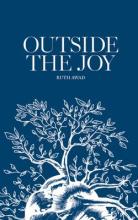
Tracing losses both interpersonal and universal – from a mother’s failing heart to environmental and economic decline ravaging ancestral homelands – Outside The Joy is a compendium of abundance in a world rife with want. With a voice as singular as it is illuminating, Awad explores the sharp contrasts of our shared existence: the human capacity to hurt and to hold one another, the love and grief that grow from our ephemeral connectedness. These poems unearth the sacred in the ordinary and invite you to do the same – “if only / you’ll let the world / soften you with its touching."
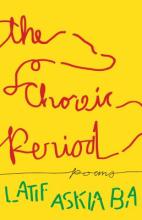
Latif Askia Ba—an acclaimed poet with Choreic Cerebral Palsy—honors all the things that arise from our unique choreographies. Meeting each reader with corporeal generosity, these poems create space to practice a radical reclamation of movement and the body... These poems are percussive and syncopated, utilizing a polylingual braid of French, Spanish, Jamaican, Fulani, and Wolof, reminding the Anglophone reader: “I am not here to accommodate you.” Because these poems are not so much for you as they are with you, an accompaniment rather than an accommodation, something to be rather than something to own. With startling nuance, The Choreic Period encourages us to “relinquish the things that we have. And mark the thing that we do,” all to see and sing the vital “thing that we be.”
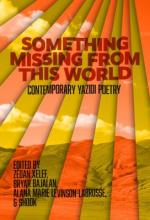
Ten years have passed since the 73rd genocide of the Yazidis, who have faced ongoing persecution, displacement and ethnic cleansing from their ancestral lands in the Kurdish regions. In wake of this new genocidal violence, new poetic voices have emerged in university campuses and IDP camps along the borders of Syria, Iraq, and Turkey. With globalizing forces compounding the erasure of their culture and traditions, the Yazidi poets in this multilingual anthology firmly stand their ground, their art a testament to Yazidi resistance and presence. The poetic tradition of the Yazidis has historically preserved and documented instances of their traditions, dispossessions and erasures. This anthology joins in this chorus; it is its own act of witnessing to recount the 2014 genocide for future generations.
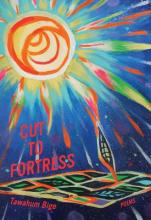
With an upbringing in Surrey, fraught familial conflicts, the passing of his older brother and its influence on his world view, Bige slices through the forts built overtop occupied Turtle Island to examine their origin and his own. His journey climbs into the mountains while he reconnects with his Dene and Cree cultures like a gripping hand on jagged rock. His path draws into the concrete urban streets that Wetako-medicine lurks through, especially for his people. The labour of these travels brings him to the springs where healing passed-down traumas becomes possible by drawing water through vulnerability.
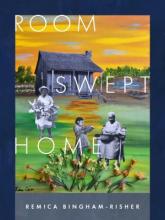
In a strange twist of kismet, two of Bingham-Risher's ancestors intersect in Petersburg, Virginia, forty years before she herself is born: her paternal great-great-great grandmother, Minnie Lee Fowlkes, is interviewed for the Works Progress Administration Slave Narratives in Petersburg in 1937, and her maternal grandmother, Mary Knight, is sent to Petersburg in 1941, diagnosed with "water on the brain"—postpartum depression being an ongoing mystery—nine days after birthing her first child. Marrying meticulous archival research with Womanist scholarship and her hallmark lyrical precision, Bingham-Risher's latest collection treads the murky waters of race, lineage, faith, mental health, women's rights, and the violent reckoning that inhabits the discrepancy between lived versus textbook history.
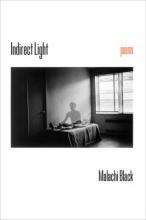
Reliving the overdoses of beloved friends, Malachi Black closes this book’s opening poem with a resuscitating command: “Doctor, / turn back. One of us lives.” Insofar as this collection returns to friends and kin to honor them by the indirect light of memory, it also seeks to memorialize the author’s personal experience of adolescence and addiction amidst the opioid epidemic. It is a lament for all that’s lost and a paean to the near misses and the just enough: a dim glow you can see by, a cup of coffee passed during NA, a prayer during detox to “be // as empty / as the sky” if floating means survival.
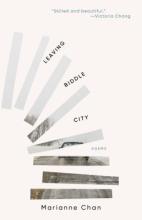
A coming-of-age narrative, Leaving Biddle City details one Filipina American speaker's experience of growing up amid a white, Midwestern suburbia mythologized as "Biddle City." Through prose poems, pantoums, ballads, flattened haikus, and thematic autobiographies, Chan maps a territory of intergenerational conflict, racial alienation, and memory and forgetfulness.
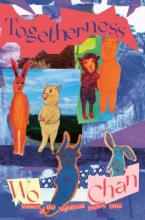
Togetherness sends out sparks from its electric surface, radiating energy and verve from within its deep and steady emotional core: stories of the poet’s immigrant childhood spent in their family’s Chinese restaurant, culminating in a deportation battle against the State. These narrative threads weave together monologue, soaring lyric descants, and document, taking the positions of apostrophe, biography, and soulful plaint to stage a vibrant and daring performance in which drag is formalism and formalism is drag—at once campy and sincere, queer, tender, and winking.
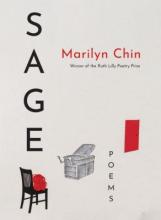
A rebellious, refined, provocative, and audacious volume from award-winning poet Marilyn Chin. In her galvanizing sixth collection of poems, Marilyn Chin once again turns moral outrage into unforgettable art. A rambunctious take on our contemporary condition, Sage shifts skillfully in tone and register from powerful poems on social justice and the pandemic to Daoist wild-girl satire.
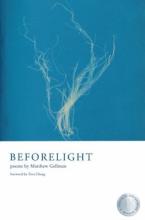
Beforelight explores queer childhood as a site of rupture and queer coming-of-age as a process of both becoming and unbecoming. The speaker in these poems confronts the impacts of ruptured relationships and trauma on his nascent identity. Grounded, lyrical, and deeply psychological, these poems grapple with the fragility of our most formative relationships - familial, communal and ancestral - as the speaker searches for a communion with himself, and how not to "make a life out of pain."
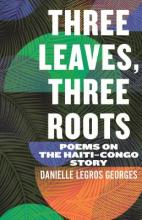
Between 1960 and 1975, thousands of Haitian professionals emigrated to Congo, a fellow Black francophone nation that emerged under the revolutionary new leadership of Patrice Lumumba. As Danielle Legros Georges writes in the introduction to this collection, these émigrés sought to “escape repression in Haiti, start new lives in Africa, and participate in a decolonizing Congo.” Among them were her parents. Grounded in these personal and social histories, Three Leaves, Three Roots is a collection of Legros Georges’s creative reconstructions of the Haiti-Congo experience. This collection is an important work of Haitian American poetry and of Black history: it reminds us, artfully, that movements of solidarity among people of color have always existed and always will exist.
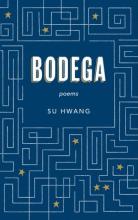
Against the backdrop of the war on drugs and the 1992 Los Angeles Riots, a Korean girl comes of age in her parents’ bodega in the Queensbridge projects, offering a singular perspective on our nation of immigrants and the tensions pulsing in the margins where they live and work. In Su Hwang’s rich lyrical and narrative poetics, the bodega and its surrounding neighborhoods are cast not as mere setting, but as an ecosystem of human interactions.
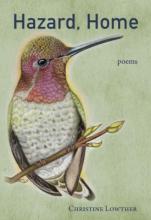
With admiration for the land holders (trees) and inhabitants of the rainforest, wetlands and oceans of her home, former Tofino Poet Laureate Christine Lowther delves into the pressing issues of urbanization, climate change, and loss of biodiversity while expressing her deep concern for those feathered, furred, webbed, and rooted. Hazard, Home is set apart from traditional nature poetry by its decolonial lens which pays tribute to stolen lands as well as displaced people and cultures. Through her evocative writing, Lowther inspires us to celebrate the beauty of nature while recognizing the urgent need for change.
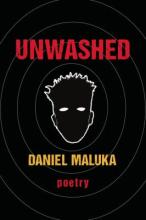
Unwashed is a deeply personal collection of poetry centering on themes of growing up, a loss of innocence, the immigrant experience, love, and alienation. The title of the collection is a reference to the urgency of the work. These are not romantic or quiet poems; they are loud and in-your-face. They speak directly to the collective anxieties of urban life and reflect the author's unique experience as an immigrant to Canada, his family background, and the diverse urban setting of Toronto. All these factors combine to create a tapestry of image-rich and intense poetry.
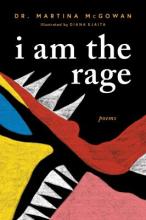
I Am the Rage is a poetry collection that explores racial injustice from the raw, unfiltered viewpoint of a Black woman in America. Dr. Martina McGowan is a retired MD, a mother, and a poet. Her poetry provides insights that no think piece on racism can; putting readers in the uncomfortable position of feeling, reflecting, and facing what it means to be a Black American. This entire collection was created during 2020, many shortly after the deaths of Breonna Taylor and George Floyd, to name but a few.
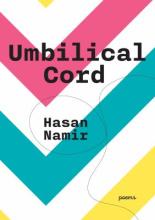
Lambda Literary and Stonewall Book Award-winner Hasan Namir shares a joyful collection about parenting, fatherhood and hope. These warm free-verse poems document the journey that he and his husband took to have a child. Between love letters to their young son, Namir shares insight into his love story with his husband, the complexities of the IVF surrogacy process and the first year as a family of three. Umbilical Cord is a heartfelt book for parents or would-be parents, with a universal message of hope.
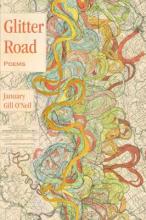
“My poems brought me to Oxford, Mississippi a.k.a. the velvet ditch: / a place you can fall into, get comfortable among confederate rebels,” writes January Gill O’Neil in her stunning new collection, Glitter Road. The poems in this book look back at the end of a marriage, a heartbreaking loss, and a new relationship against the backdrop of a Mississippi season. O’Neil reflects on the history and legacy of Emmett Till, how his story is intertwined with her own, and wades through the incredible grief she feels for herself, her children, and the Black children who won’t come home tonight. These poems reclaim the vulnerable, intimate parts of a life in transition and celebrate womanhood through awakenings, landscapes, meanders, and possibilities.

Tonguebreaker is about surviving the unsurvivable: living through hate crimes, the suicides of queer kin, and the rise of fascism while falling in love and walking through your beloved's neighbourhood in Queens. Building on her groundbreaking work in Bodymap, Tonguebreaker is an unmitigated force of disabled queer-of-colour nature, narrating disabled femme-of-colour moments on the pulloff of the 80 in West Oakland, the street, and the bed. Tonguebreaker dreams unafraid femme futures where we live -- a ritual for our collective continued survival.
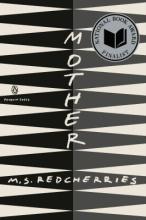
A stunning, multimorphic work of poetry and prose about Indigenous identity. Mother is a work rooted in an intimate an Indigenous child is adopted out of her tribe and raised by a non-Indian family. As an adult finding her way back to her origins, our unnamed narrator begins to put the pieces of her birth family's history together through the stories told to her by her mother, father, sister, and brother, all of whom remained on the reservation where she was born. Through oral histories, family lore, and imagined pasts and futures, a collage of their community builds, raising profound questions about adoption, inheritance, and Indigenous identity in America.
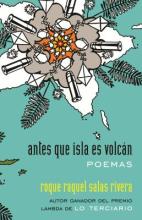
In sharp, crystalline verses, written in both Spanish and English versions, Antes que isla es volcán daringly imagines a decolonial Puerto Rico. Salas Rivera unfurls series after series of poems that build in intensity: one that casts Puerto Rico as the island of Caliban in Shakespeare's The Tempest, another that imagines a multiverse of possibilities for Puerto Rico's fate, a 3rd in which the poet demands his right to a future and its immediate distribution. The verses are rigorous and sophisticated, engaging with literary and political theory, yet are also hard-hitting, charismatic, and quotable ("won't you be sorry? / won't you wish you had a boss? / won't you get restless / with all that freedom?").
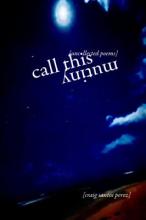
These poems were originally published in journals and anthologies between 2008-2023, but this is the first time they have been collected into a single volume. Throughout, Perez continues his critical exploration of native cultures, decolonial politics, colonial histories, and the entangled ecologies of his homeland of Guam, his current residence of Hawaiʻi, and the larger Pacific region in relation to the Global South and the Indigenous Fourth World. As he reminds us about the power of storytelling: "If we can write the ocean, we will never be silenced."
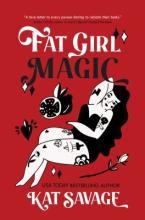
Fat Girl Magic is a unique dissection of the truly powerful journey from the way others perceive, label, and judge our bodies to our own discoveries, acceptance, and love we find for ourselves. This beautifully presented edition invokes a witchcraft framework to explore the journey to self-love and acceptance in a uniquely honest way. Intended to be thought provoking and insightful, this collection will pull you from your loneliness, help you realize the magic within yourself, and welcome you into a coven of healing and the shared ideal that all bodies deserve respect, love, and space within our society.
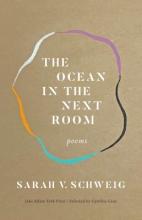
Positioned from within the morass of modern-day living, The Ocean in the Next Room searches for the hard, abiding particles of truth buried beneath our frenzied consumer culture. Stillness. Sunsets. The circadian rhythm of trees. These poems guide us to look past branding, content-creation, and relentless jargon to find meaning in those layers of the world that operate without human intervention. In verse that is at once inventive and innately familiar, Schweig unpacks the urge to make art, life, and connections even at the risk of becoming further entangled in the Anthropocene. Profound and clear-sighted, this collection urges us to lift our gazes from our screens and really look at the world around us.
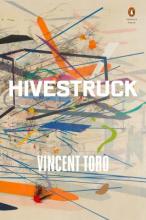
Vincent Toro's third collection of poetry is a work of Latinxfuturism that confronts the relationship human beings have with technology. The poems are meditations on social media and surveillance culture, satires on science fiction and the space race, interrogations of artificial intelligence, cyborg economics, and biohacking, and tributes to women and queer and BIPOC people who have contributed and are contributing to human survival and progress in a technology obsessed world.
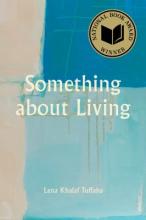
It's nearly impossible to write poetry that holds the human desire for joy and the insistent agitations of protest at the same time, but Lena Khalaf Tuffaha's gorgeous and wide-ranging new collection Something About Living does just that. Her poems interweave Palestine's historic suffering, the challenges of living in this world full of violence and ill will, and the gentle delights we embrace to survive that violence. Khalaf Tuffaha's elegant poems sing the fractured songs of Diaspora while remaining clear-eyed to the cause of the fracturing: the multinational hubris of colonialism and greed. This collection is her witness to our collective unraveling, vowel by vowel, syllable by syllable.
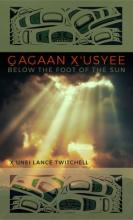
Identity and understanding are fluid and plural, yet the histories of violence and oppression influence and shape everything in the world because the past, present, and future exist in the same plane and at the same time. Gagaan X'usyee / Beneath the Foot of the Sun is a unique collection of Indigenous cultural work and Lingit literature in the tradition of Nora Marks Dauenhauer, and in the broader contemporary company of Joy Harjo and Sherwin Bitsui.